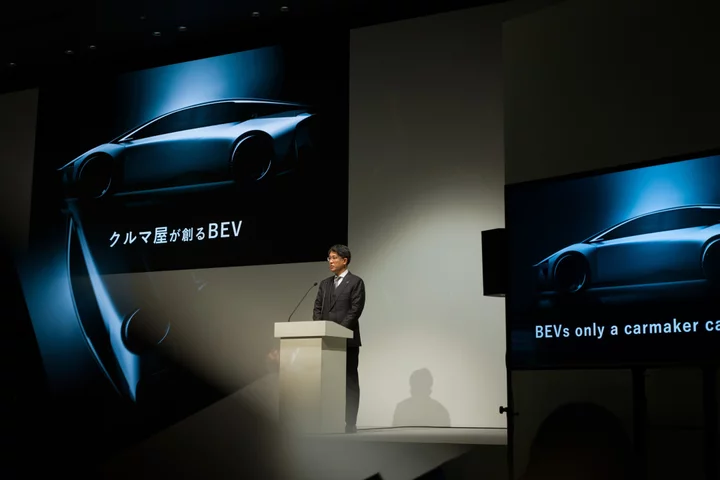Toyota Motor Corp.’s annual shareholder meeting is poised to become a referendum of sorts on the Japanese carmaker’s electric vehicle strategy, thanks to a handful of outspoken foreign investors.
A small but growing list of shareholders oppose the reappointment of Chairman Akio Toyoda on Wednesday, arguing that Toyota has fallen behind rivals because of his commitment to a “multi-pathway” approach — offering customers various options by selling gasoline and hybrid cars while investing in EVs, hydrogen and carbon neutral fuels. Some investors are also demanding transparency on lobbying over climate policies that appear to favor EVs, or seek to ban cars that burn fossil fuels.
Corporate shareholder meetings in Japan have long been pro forma affairs, with company-backed directors winning solid majorities more often than not. While individual investors can attending are often vocal — both in their support and criticism of management — the annual gatherings are now becoming a forum for institutional shareholders to draw attention to issues of climate change and corporate governance.
“The biggest difference between this year and past shareholding meetings is that such proposals were made at all,” said Koji Endo, managing director at SBI Securities Co.
Wednesday’s meeting at Toyota’s headquarters near Nagoya will be Koji Sato’s first since succeeding Toyoda as chief executive officer in April. While Sato has said there’s no change to his predecessor’s strategy, the new president has also championed what he calls an “EV-first” approach.
Read More: Toyota’s Shift to Electric Future Rests on Koji Sato’s Shoulders
Two of the biggest pension funds in the US — the California Public Employees Retirement System and the New York City Comptroller’s office — have said they plan to vote against Toyoda.
“The growing battery electric vehicle market represents an opportunity for Toyota to regain its status as an innovator and leader during the historic transition of the transportation industry,” New York City Comptroller Brad Lander said in a statement.
Toyota has pushed back against assertions that it’s dragging its feet. After announcing a ¥4 trillion ($28.7 billion) commitment to accelerate its shift into EVs in late 2021, the company still faced criticism for arguing that the transition will take longer than people expect.
Last week, Toyota invited journalists and analysts to its research facility near Mount Fuji for a day of test drives and technology briefings to bolster confidence in the company’s ability to sell 1.5 million battery EVs annually by 2026, and 3.5 million by 2030. Those would be massive steps up from the 38,000 EVs that Toyota sold in the fiscal year that ended in March.
Read More: Toyota’s Tech Chief Lays Out a Path to Selling Millions of EVs
“Even in this difficult business environment, Chairman of the Board Akio Toyoda has been strengthening our competitiveness from a long-term perspective,” a spokesperson for the company said in a statement.
In May, proxy advisory firm Glass Lewis & Co. urged shareholders to vote against Toyoda as well as three nominees for auditors, citing concerns over a shortage of independent directors and non-male board members.
Toyota said it abides by the Tokyo Stock Exchange’s requirement that independent directors must account for a third of the company’s board.
“We are determined there’s no concerns regarding the objectivity, independence and ability to conduct appropriate oversight as stated in a report by Glass Lewis,” the company said in a statement.
A proposal fielded last month by a trio of European asset managers — Danish pension fund AkademikerPension, Norwegian financial services company Storebrand Asset Management AS, and Dutch group APG Asset Management NV — which collectively hold $400 million in Toyota shares, called on Toyota to improve disclosure of its lobbying against climate policies.
“Toyota has demonstrated leadership on climate change in a number of important areas,” said Yoo-Kyung Park, Asia Pacific head of global responsible investment and governance for APG Asset Management. “However, despite improved transparency, the company has also continued to lobby against climate-related regulation and policies. We’re concerned the company is missing out on profits from soaring electric vehicle sales, jeopardizing its valuable brand, and cementing its global laggard status.”
AkademikerPension will also vote against Toyoda’s reappointment, Chief Investment Officer Anders Schelde said.
Institutional Shareholder Services Inc., another proxy firm, encouraged shareholders to support the proposal that Toyota disclose more about its efforts to influence policies to address climate change. The advice was heeded by the Church of England Pensions Board, which holds about £4.5 million ($5.6 million) in Toyota shares, according to Laura Hillis, the board’s director of climate and environment.
Hillis said she’s concerned that Toyota’s negative lobbying on climate change — specifically against strict EV mandates and efforts to phase out gasoline cars — contradict its promises to expand electric vehicle production and become carbon neutral by 2050.
Toyota’s board has opposed the proposal, saying the company is already releasing data and information on its activities pertaining to climate change.
While it’s highly unlikely that Toyoda will be ousted from the board, even a marginal dip in support could be seen as a sign the founder’s grandson, as well as the board, should do more to heed investor concerns. Toyoda was reappointed last year with 96% of the vote.
“I don’t think anybody expects Toyoda to be ousted, but this could damage his support base,” said Bloomberg Intelligence analyst Tatsuo Yoshida.

